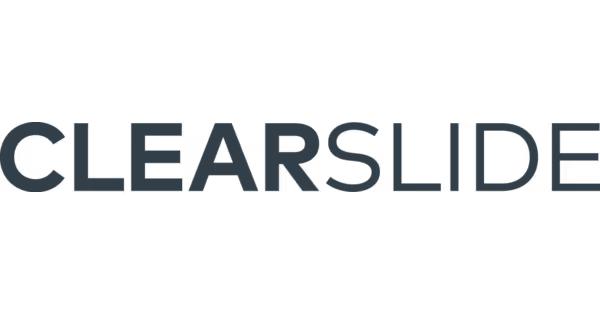SalesIntel Alternatives
Explore 10 SalesIntel alternatives. This guide compares top B2B data providers to help you choose the best platform for your company's needs.

SalesIntel is a popular tool, and for good reason. It performs well for data enrichment and provides accurate contact information. Many teams rely on it to build their prospect lists and fuel their sales pipeline.
But like any tool, it has limits. Some users report data gaps in niche industries or occasional outdated contacts. So, we analyzed the top alternatives based on reviews to help you shortlist your options. Let's get started.
Consider 11x for Digital Sales Workers
If your team wants to use digital workers for sales tasks, 11x offers a relevant option. This approach focuses on the automation of specific sales functions to support your human staff.
We built 11x as a go-to-market platform where AI agents handle the sales workflow.
Our agent Alice identifies prospects, conducts outreach via email and LinkedIn, and updates your CRM. Julian, another agent, qualifies inbound leads and schedules meetings.
With this setup, we replace separate tools for data enrichment, outreach, and email warmup by combining them into a single platform.
SalesIntel Alternatives
The following sections break down the top SalesIntel alternatives. We examine each tool's pricing, features, and specific advantages or drawbacks relative to SalesIntel.
1) ZoomInfo SalesOS
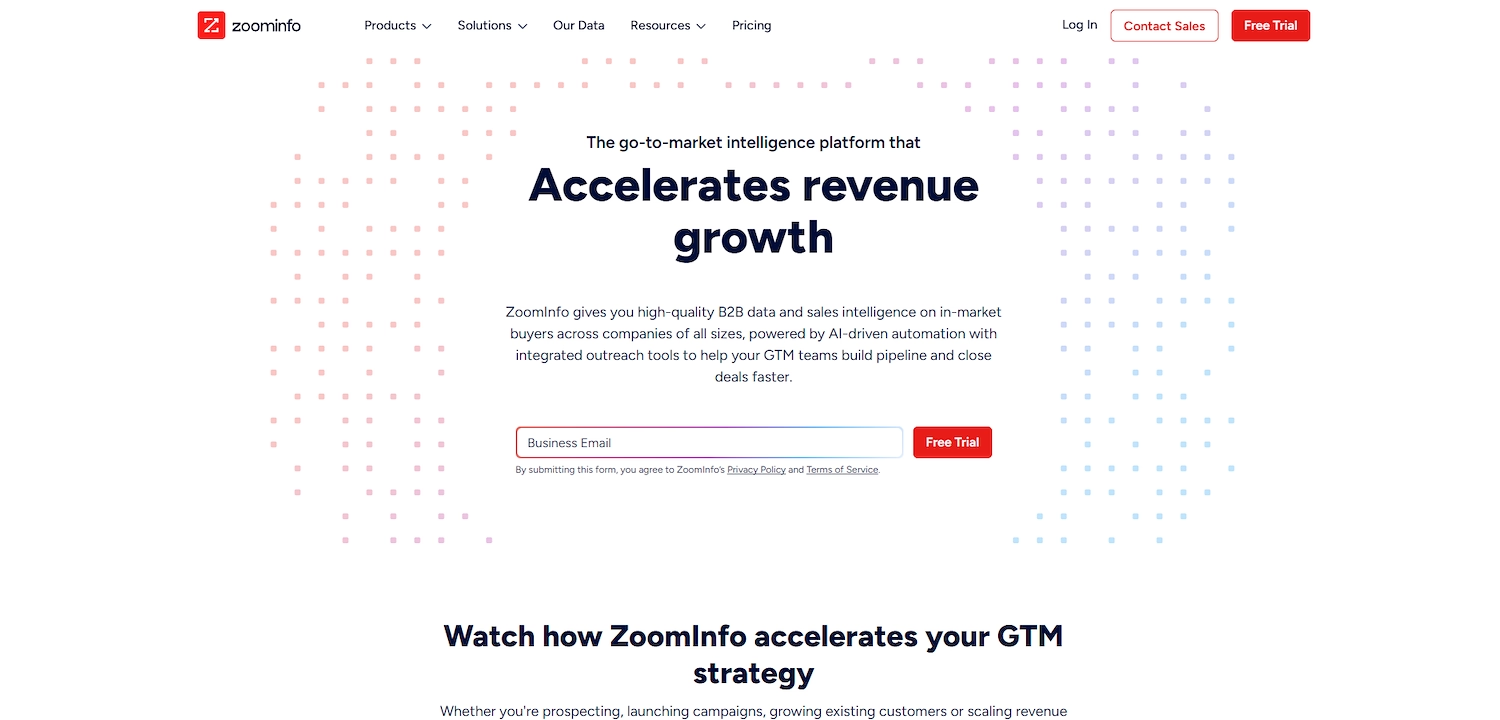
ZoomInfo SalesOS is a go-to-market intelligence platform for B2B organizations. It unifies contact and company data, buyer-intent signals, and engagement tools into a single system.
Teams use it to build prospect lists and for data enrichment. The platform automates data hygiene and can append or refresh CRM data in real time.
ZoomInfo SalesOS's Main Features
- It provides real-time buyer intent signals to help teams identify prospects who are ready to buy.
- The platform includes conversation intelligence to analyze interactions from phone calls and meetings.
- A generative AI companion, Copilot, helps users find insights and compose outreach messages.
- It offers website visitor tracking to identify anonymous traffic and convert page views into potential leads.
How ZoomInfo SalesOS Compares to SalesIntel
Average Review score: 4.5/5 stars based on 8,738 G2 reviews.
- ZoomInfo SalesOS offers buyer-intent signals to find prospects ready to buy. This is a more advanced feature compared to SalesIntel's core data offerings.
- It includes a generative AI assistant, Copilot, that suggests who to contact and what to say. SalesIntel does not offer a similar AI writing tool.
- The platform has conversation intelligence to analyze sales calls and meetings for insights. In contrast, SalesIntel's features center on pre-outreach data.
- A website visitor tracking feature identifies anonymous traffic to generate new leads. This is a capability not found within SalesIntel's standard toolset.
Where ZoomInfo SalesOS Falls Short
- The platform's pricing is on the higher end. This might be a consideration for smaller teams when compared to SalesIntel's more flexible pricing tiers.
- Some users report that contact information can occasionally be outdated. This is a point to consider when you compare data freshness against SalesIntel.
- Implementation can be more involved compared to SalesIntel. This might be a factor for teams that need to get started quickly.
- The tool's wide range of features, while powerful, can be a source of complexity for teams that only need core contact data. SalesIntel offers a more streamlined experience.
How the Pricing Models Compare
SalesIntel generally offers more flexible pricing tiers, which can be advantageous for smaller teams. In contrast, ZoomInfo SalesOS is positioned at the higher end of the market, reflecting its extensive feature set and broader platform capabilities.
2) Apollo.io
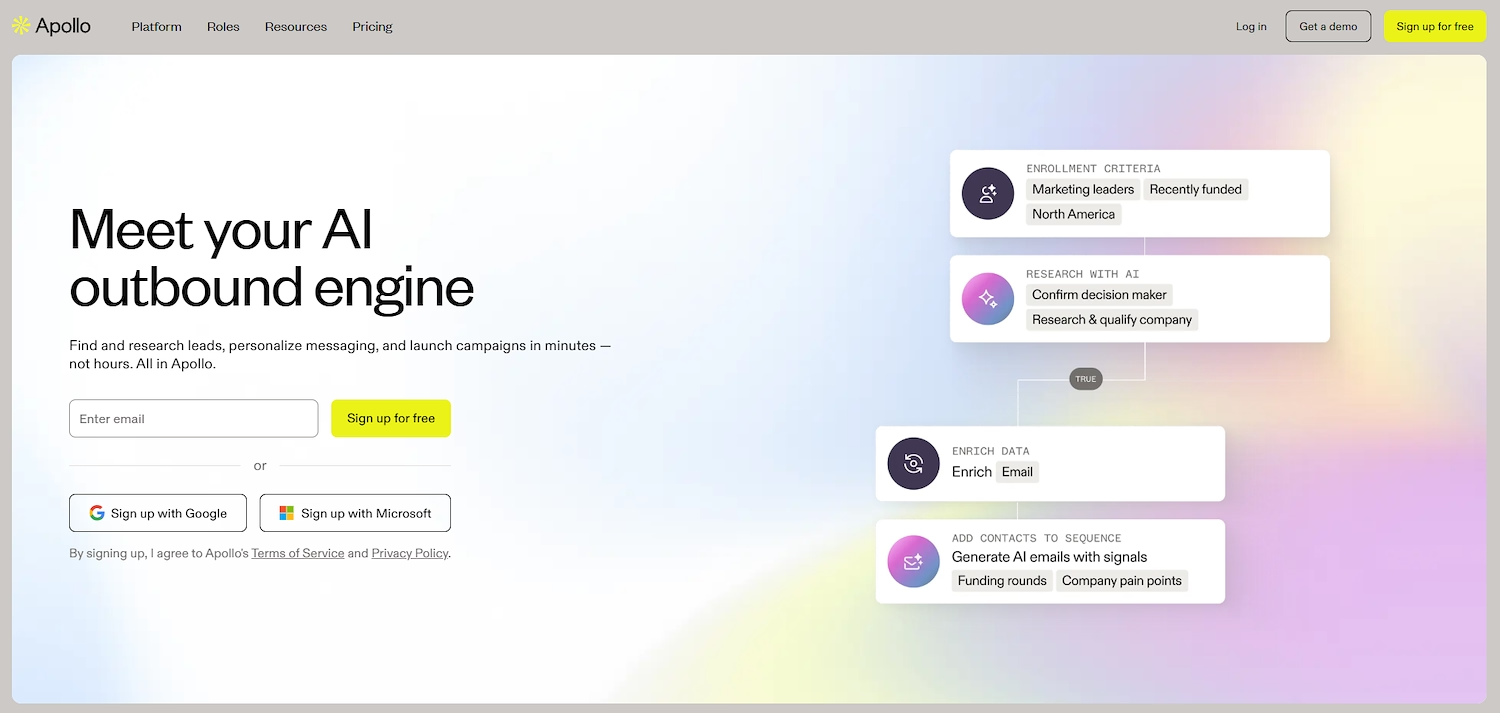
Apollo.io is a sales intelligence platform that combines a B2B database with engagement tools. Teams use it to find prospects and enrich CRM data. The system provides verified email addresses and direct phone numbers to support sales operations and list creation efforts.
Apollo.io's Main Features
- It includes an email sequencer to automate outreach campaigns with personalized follow-ups.
- A rules engine automates tasks and can add prospects to sequences or update CRM records based on triggers.
- The platform provides analytics on email open rates, reply rates, and meeting bookings to measure campaign performance.
- It offers a built-in dialer to make calls directly from the platform and log the activity.
How Apollo.io Compares to SalesIntel
Average Review score: 4.7/5 stars based on 8,904 G2 reviews.
- Apollo.io provides an email sequencer to automate outreach campaigns. This contrasts with SalesIntel, which focuses on supplying data rather than managing the outreach process itself.
- It includes a rules engine that automates sales tasks. For example, it can add prospects to a sequence automatically, a function not found in SalesIntel's data-centric platform.
- The platform offers a built-in dialer to make calls and log activity directly. This integrates communication into the workflow, while SalesIntel primarily serves as a data source for external tools.
- Users get analytics on email open rates and meeting bookings. This performance tracking is a feature that distinguishes it from SalesIntel, which does not have a comparable analytics suite.
Where Apollo.io Falls Short
- Some users report that Apollo.io's data can be less accurate than SalesIntel's. SalesIntel uses a human research team to verify its data, which often results in higher accuracy for direct-dials and emails.
- The platform does not offer a research-on-demand feature. In contrast, SalesIntel allows users to request specific contact information, which its team then researches and provides for hard-to-find prospects.
- Its all-in-one model means data quality is one of many focuses. SalesIntel concentrates solely on data provision, which can be an advantage for teams that prioritize data accuracy above integrated engagement tools.
How the Pricing Models Compare
Apollo.io offers transparent pricing with a free plan and paid tiers starting at $49 per user per month. In contrast, SalesIntel generally provides more flexible, quote-based pricing. This approach may better suit teams with custom needs but lacks the upfront cost clarity of Apollo.io's model.
3) Lusha
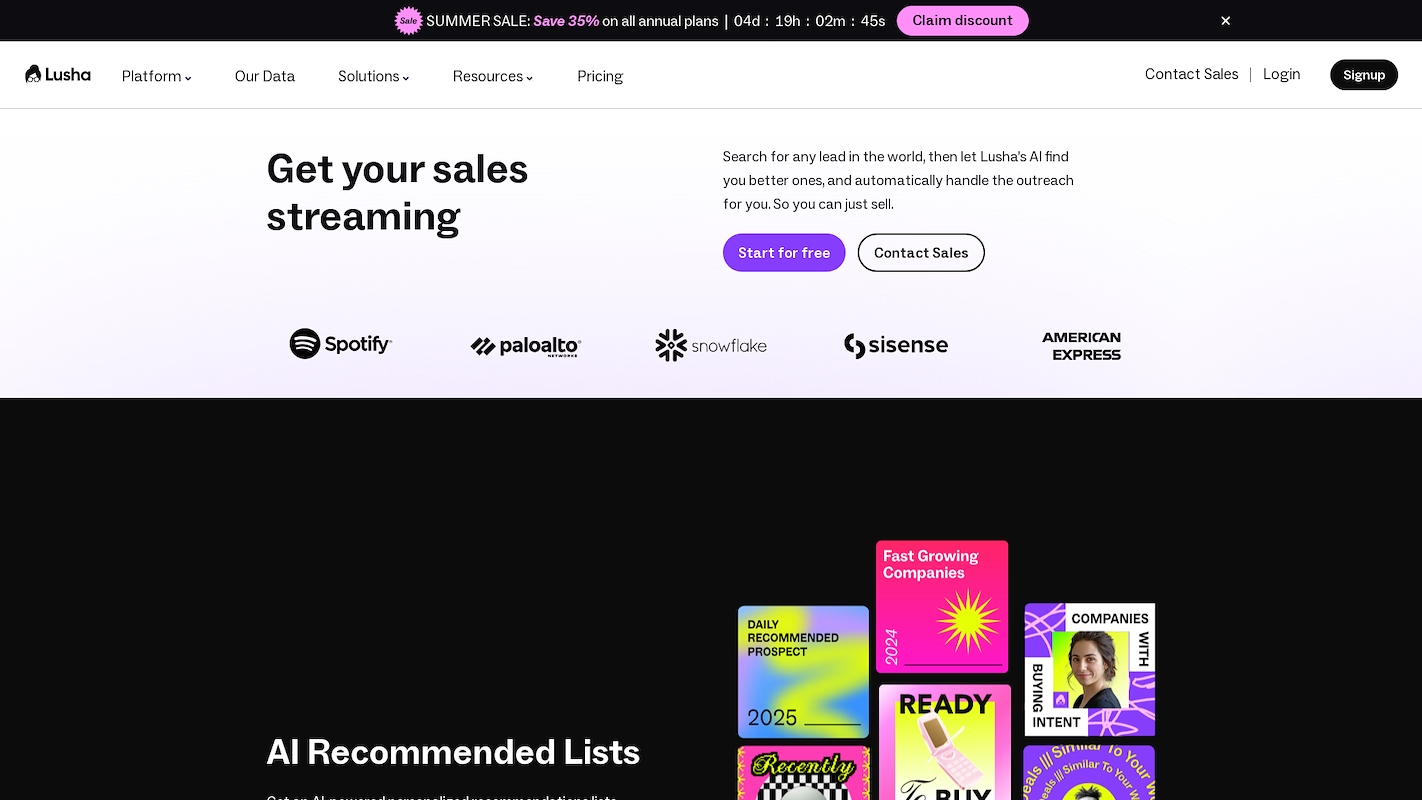
Lusha is a sales intelligence platform for B2B lead searches. It provides AI recommendations for similar prospects and automates outreach. Teams use it to build prospect lists and integrate compliant data into their sales stacks through APIs and native connectors. The platform helps keep CRM records current and actionable.
A dedicated data enrichment feature to add firmographic and technographic insights is planned for a future release.
Lusha's Main Features
- It provides AI-recommended lists and auto-updating prospect playlists that add new leads at user-defined intervals.
- The platform identifies in-market buyers and sends real-time notifications based on intent triggers.
- An engagement feature automates and personalizes email sequences with AI-generated copy.
- It includes a tool to record and analyze sales meetings for performance insights.
How Lusha Compares to SalesIntel
Average Review score: 4.3/5 stars based on 1,516 G2 reviews.
- Lusha provides AI-recommended prospect lists that automatically refresh. This is different from SalesIntel, where users generally build and manage static lists manually.
- The platform identifies in-market buyers and sends real-time alerts. This offers a more proactive signal compared to SalesIntel’s data-on-demand model.
- It includes an engagement feature to automate email sequences with AI-generated copy. SalesIntel supplies contact data but lacks a comparable built-in outreach tool.
- The tool offers a feature to record and analyze sales meetings for insights. In contrast, SalesIntel’s capabilities center on pre-outreach data gathering.
Where Lusha Falls Short Compared to SalesIntel
- Some users report that Lusha's contact information is occasionally out of date. In contrast, SalesIntel uses a human research team to verify its data, which can result in higher accuracy.
- The platform does not offer a research-on-demand service. SalesIntel allows users to request specific contact details for its team to find, which is useful for hard-to-find prospects.
- Its dedicated feature for firmographic and technographic data enrichment is planned for a future release. This capability is a core part of SalesIntel's current toolset.
How the Pricing Models Compare
Lusha offers transparent pricing with a free plan and paid tiers starting at $36 per user per month, which provides cost clarity for smaller teams. In contrast, SalesIntel uses a quote-based model that may offer more flexibility for organizations with custom data requirements.
4) Clearbit
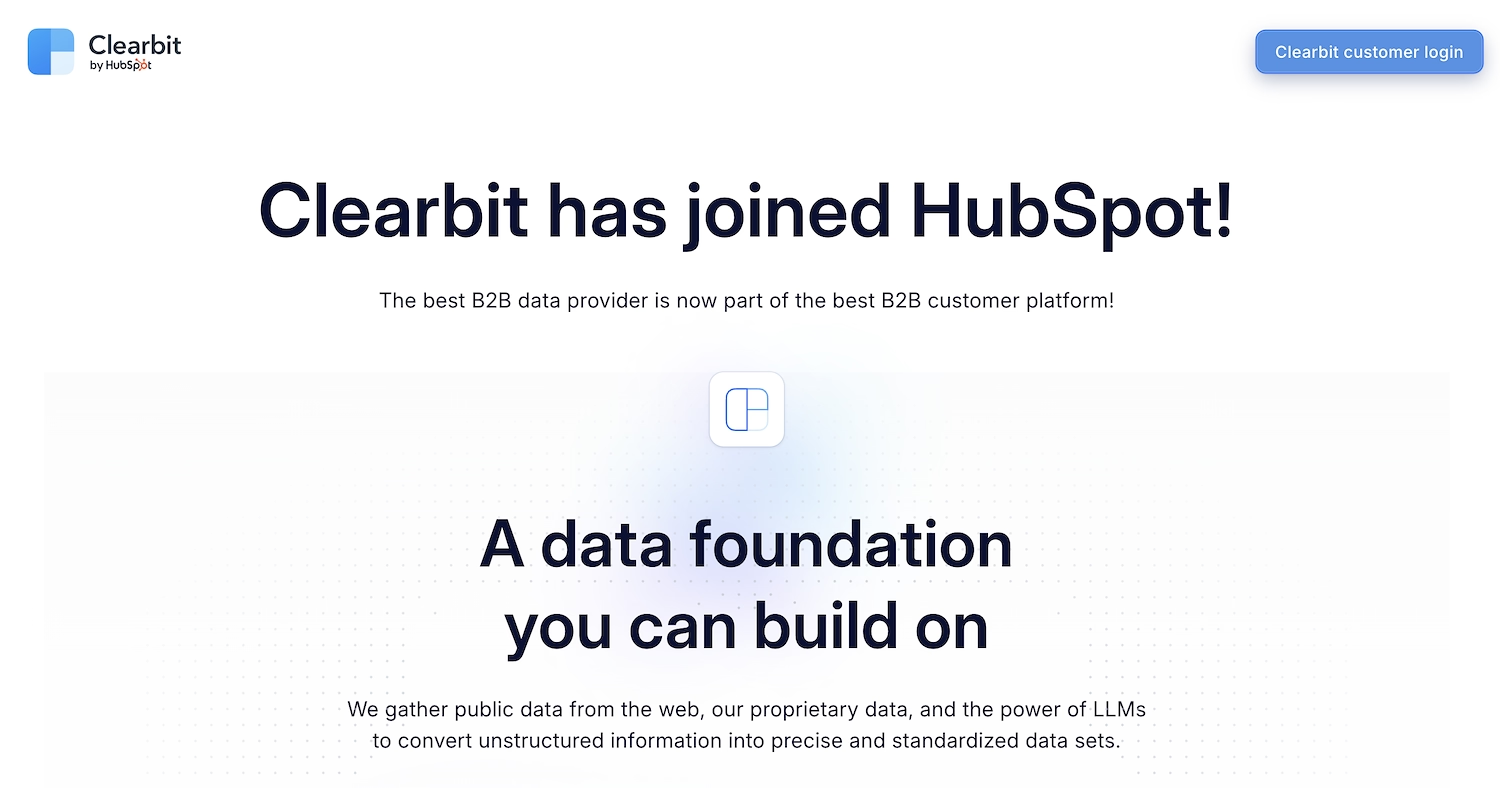
Clearbit is a marketing data platform for B2B companies. It provides data to enrich records and reveal details about prospects and customers. Teams use this information to understand their audience, identify high-fit accounts, and personalize marketing and sales interactions across the funnel.
Clearbit's Main Features
- The platform aggregates public web data and proprietary sources, then applies LLM techniques to create standardized datasets.
- It de-anonymizes website traffic to reveal companies that visit and match the ideal customer profile.
- The service provides data for instant lead score calculations and routing based on deep industry classifications and corporate hierarchy.
- It shortens web forms through automatic data enrichment, which can reduce friction and boost conversion rates.
How Clearbit Compares to SalesIntel
Average Review score: 4.4/5 stars based on 626 G2 reviews.
- Clearbit de-anonymizes website traffic to identify companies visiting your site. This is different from SalesIntel, which primarily provides contact data from its database rather than identifying live web visitors.
- It offers a feature to shorten web forms by automatically filling in data for known prospects. While SalesIntel provides data for enrichment, it does not have a comparable tool for direct web form optimization.
- The platform provides data specifically for instant lead scoring and routing. In contrast, SalesIntel supplies contact and company data but does not include a built-in lead scoring or routing mechanism.
- This tool uses machine learning to process its data. This automated approach is a point of difference from SalesIntel, which emphasizes its human-verified data collection process.
Where Clearbit Falls Short
- Clearbit relies on machine learning to process its data, which some users report can lead to outdated contacts. In contrast, SalesIntel uses a human research team, which often provides higher data accuracy.
- The tool does not include a research-on-demand service for hard-to-find prospects. SalesIntel provides this feature; its team finds specific contact information upon user request.
- Its platform focuses on marketing data intelligence, a broader scope than SalesIntel's specialization. SalesIntel concentrates on human-verified contact data, a key difference for sales-focused teams.
How the Pricing Models Compare
Clearbit and SalesIntel both utilize quote-based pricing, so costs are tailored to your specific needs. For the most accurate pricing information, you will need to contact each company's sales team directly for a custom quote.
5) Cognism
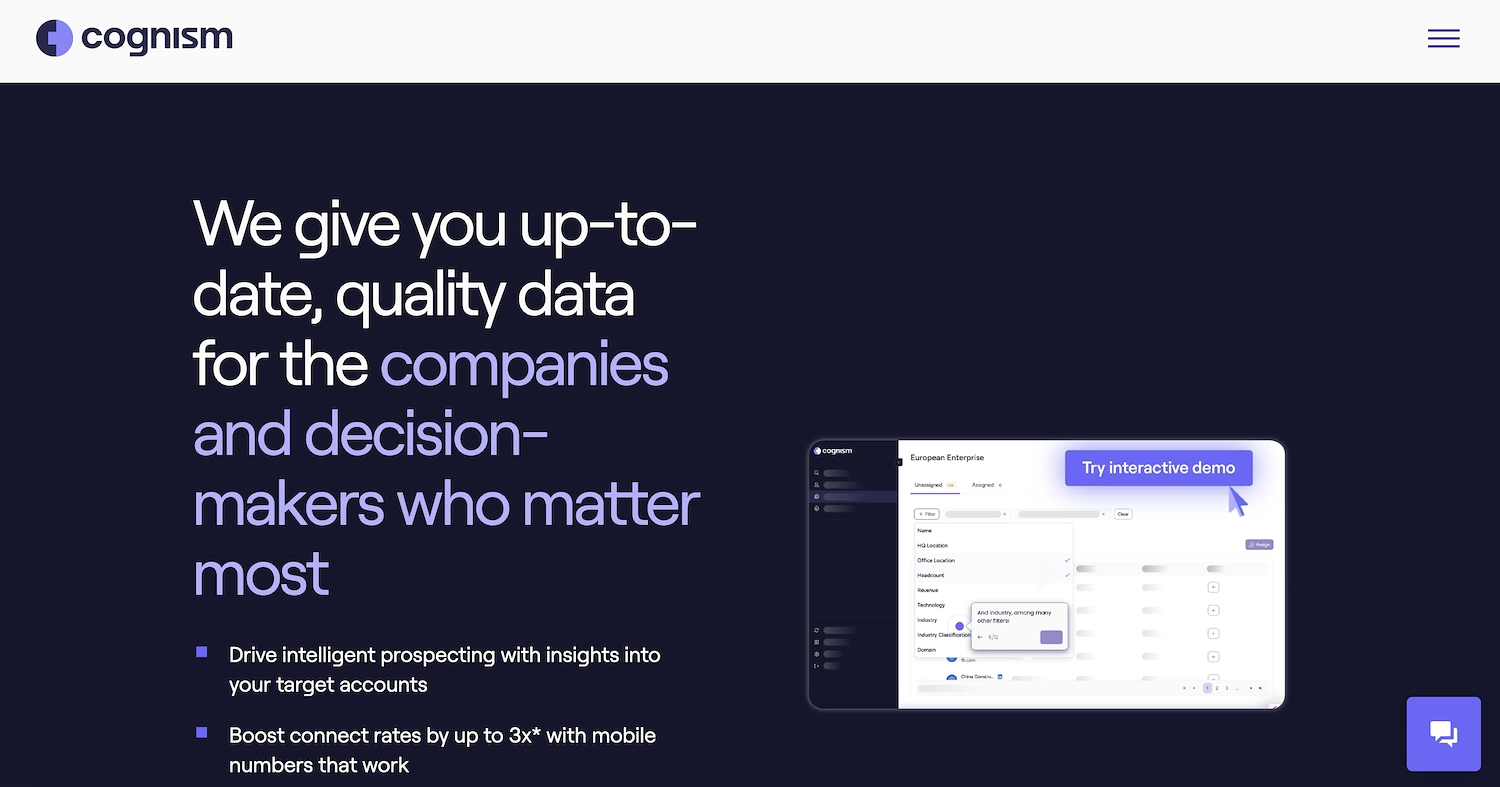
Cognism is a sales intelligence platform that provides compliant B2B data. Teams use it to find contact details and enrich their CRM records for accuracy. The service helps users build targeted prospect lists and identify opportunities that match their ideal customer profile.
Cognism's Main Features
- It provides phone-verified mobile numbers, called Diamond Data®, which are human-checked to improve connect rates.
- The platform offers extensive coverage of mobile numbers and email addresses for contacts in the UK and EMEA regions.
- It surfaces buying signals such as hiring trends, funding rounds, and changes in a company's technology stack.
- A browser extension, Sales Companion, allows users to prospect directly from LinkedIn and corporate websites.
How Cognism Compares to SalesIntel
Average Review score: 4.6/5 stars based on 1,033 G2 reviews.
- Cognism provides phone-verified mobile numbers, called Diamond Data®, which are human-checked for accuracy. This is similar to SalesIntel's human verification but offers a specific guarantee on a premium data set to improve connect rates.
- It offers strong data coverage for the UK and EMEA markets. This regional focus can be an advantage for teams prospecting in Europe, whereas SalesIntel provides a more general global database.
- The platform identifies buying signals like company funding or hiring trends. This is different from SalesIntel, which focuses on providing contact data rather than surfacing time-sensitive intent triggers.
- A browser extension lets users find contact data directly on LinkedIn and company websites. This integrates prospecting into a user's web browsing, a workflow feature not offered by SalesIntel.
Where Cognism Falls Short Compared to SalesIntel
- Cognism does not offer a research-on-demand service. In contrast, SalesIntel provides a team to find specific contact details upon request, which is useful for hard-to-find prospects.
- Its data verification process is different. While Cognism's Diamond Data® is human-checked, SalesIntel applies its human verification process across its entire database, which can result in more consistent data quality.
- The platform's data coverage is strongest in the UK and EMEA regions. For teams that primarily target the US market, SalesIntel sometimes provides a more suitable option due to its broader database.
How the Pricing Models Compare
Both Cognism and SalesIntel use a quote-based pricing model, so you will need to contact their sales teams for a custom quote. For the most accurate pricing information from Cognism, you can visit Cognism's official website.
Automate Sales with 11x Digital Workers
If your sales process can benefit from automation, consider 11x. The platform uses AI agents to handle tasks like prospect identification, outreach, and lead qualification. This lets your sales team focus on deal closure instead of manual work.
With 11x, we use AI to run your sales playbook. Our agent Alice finds accounts and manages outreach, while Julian qualifies inbound leads and books meetings. We combine tools for intent data, email warmup, and more into one platform, eliminating extra tools.
Book a Demo to see the platform in action.
6) Seamless.AI
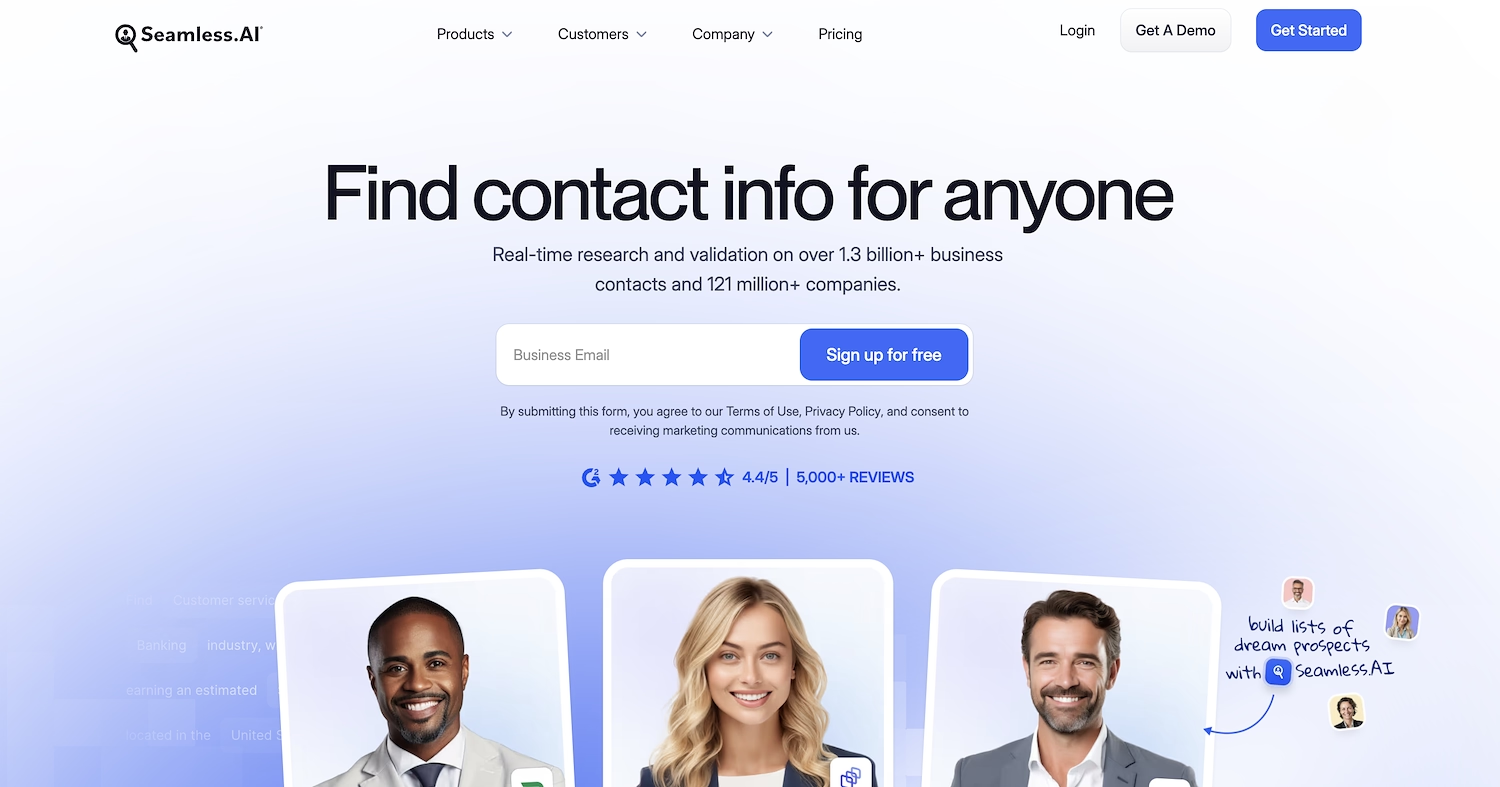
Seamless.AI is a search engine for B2B contact information. The platform provides verified phone numbers and emails for professionals. Sales teams use the service to build prospect lists and enrich CRM data. The tool automates list creation and helps users find contacts to develop their sales pipeline.
Seamless.AI's Main Features
- Surfaces buyer intent data to identify prospects who are ready to purchase.
- Monitors job changes for customers and prospects and automatically delivers updated contact information.
- Generates research and personalized pitch intelligence using AI to assist with messaging.
- Automates the list-building process with its Autopilot feature to maintain a full sales pipeline.
How Seamless.AI Compares to SalesIntel
Average Review score: 4.4/5 stars based on 5,067 G2 reviews.
- Seamless.AI provides buyer intent data to identify prospects who are ready to purchase. This offers a proactive signal, which is different from SalesIntel’s focus on contact data provision.
- The platform monitors job changes for contacts and automatically delivers their updated information. This is a specific automation feature that SalesIntel does not offer.
- It uses AI to generate research and personalized pitch intelligence to assist with messaging. In contrast, SalesIntel does not include a comparable AI writing assistant.
- An Autopilot feature automates the list-building process to maintain a full sales pipeline. This is different from SalesIntel, where users typically build and manage prospect lists manually.
Where Seamless.AI Falls Short
- Some users report that Seamless.AI's AI-verified data can occasionally be outdated. In contrast, SalesIntel uses a human research team across its database, which can lead to higher data accuracy.
- The platform does not include a research-on-demand service. SalesIntel provides this feature, where its team finds specific contact information for hard-to-find prospects upon request.
- Its data coverage can sometimes be limited in certain international regions. For teams that focus on a global market, SalesIntel may offer a more comprehensive database.
How the Pricing Models Compare
Seamless.AI offers a free plan and paid tiers, providing transparent entry points for users. In contrast, SalesIntel uses a quote-based model tailored to specific data requirements. For detailed pricing, visit Seamless.AI's official website or contact SalesIntel for a custom quote.
7) UpLead
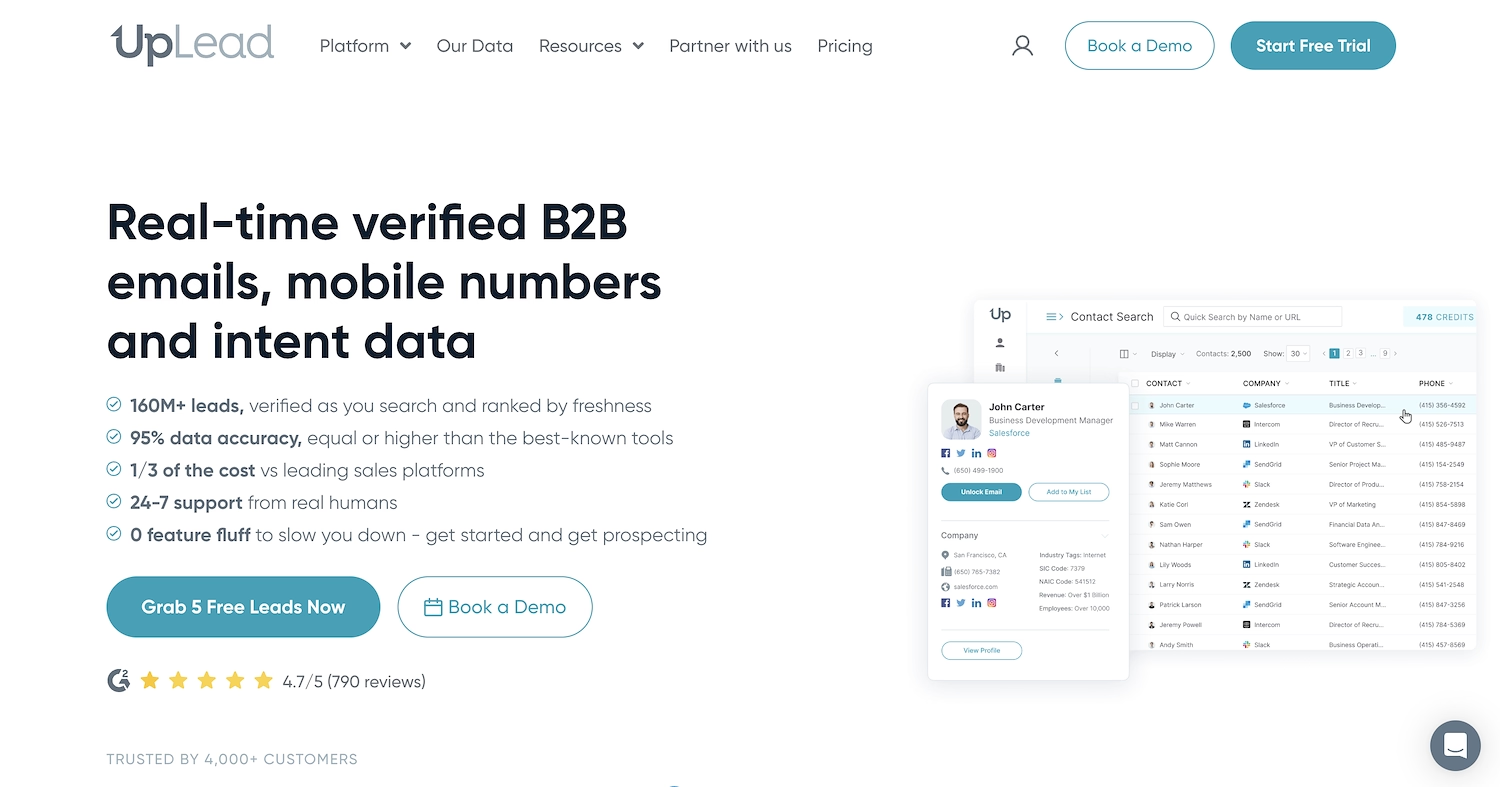
UpLead is a B2B sales intelligence platform with a focus on data accuracy. It provides verified contact and company information to support sales teams.
Users can build targeted lists, enrich CRM records, and find new prospects. The platform's real-time verification helps ensure the information is current for outreach efforts.
UpLead's Main Features
- It offers real-time email verification on every export, backed by a 95% accuracy guarantee.
- The platform provides buyer intent data to surface prospects who are actively researching relevant solutions.
- It tracks over 16,000 technology installs per company to provide technographic insights.
- A prospector tool uses more than 50 search filters to build targeted lists in real time.
How UpLead Compares to SalesIntel
Average Review score: 4.7/5 stars based on 797 G2 reviews.
- UpLead offers a 95% accuracy guarantee on its data, which it verifies in real time. This is a different approach from SalesIntel, which relies on a human-verified database that is not checked in real time.
- It provides buyer intent data to find prospects who actively seek solutions. In comparison, SalesIntel focuses on contact and company data and does not have a similar intent feature.
- The platform includes detailed technographic data and tracks over 16,000 technologies. This offers more specific insights than the general technographic information available in SalesIntel.
- This tool allows for highly targeted list creation with over 50 search filters. This provides a more granular search capability compared to SalesIntel's standard prospect filters.
Where UpLead Falls Short Compared to SalesIntel
- UpLead does not offer a research-on-demand service. In contrast, SalesIntel provides a team to find specific contact details upon request, which is useful for hard-to-find prospects.
- The platform's data verification is done in real time. This differs from SalesIntel's approach, where a human team re-verifies the data, which some users find results in higher accuracy.
- Some users report that the tool can have data gaps in niche industries. SalesIntel addresses similar issues with its research-on-demand service, a feature not available in UpLead.
How the Pricing Models Compare
UpLead offers transparent pricing with a free trial and paid tiers starting at $99 per month. This contrasts with SalesIntel's quote-based model, which is tailored to individual team requirements. UpLead's approach offers upfront cost clarity, while SalesIntel may provide more flexibility for custom needs.
8) Lead411
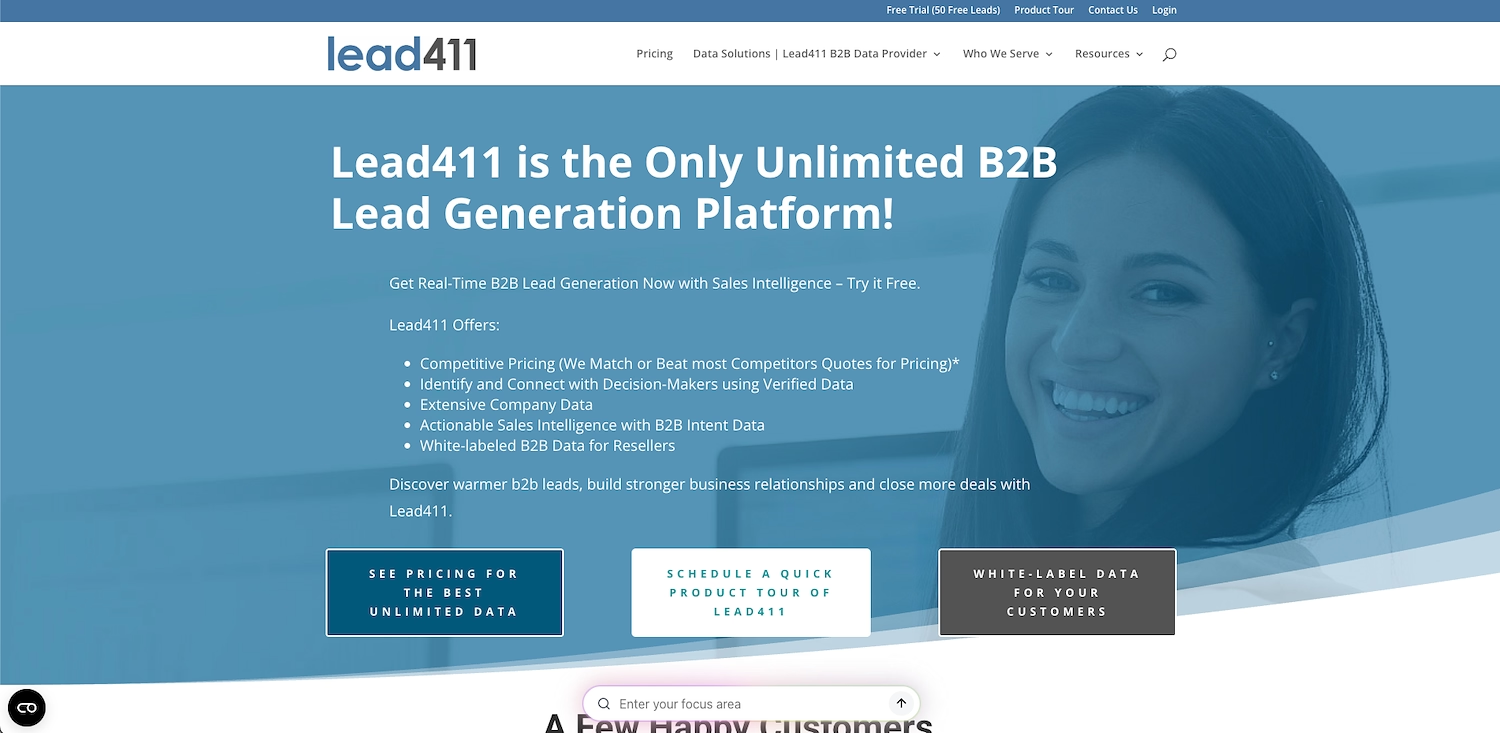
Lead411 is a B2B sales intelligence platform. It provides contact and company data to help sales teams with data enrichment and prospect identification. Users can build targeted lists and maintain the accuracy of their CRM information. The service acts as a data source for various sales operations.
Lead411's Main Features
- Offers buyer intent data powered by Bombora to identify companies researching specific topics.
- Provides growth intent data with triggers like recent funding, hiring plans, and IPO announcements.
- Includes a built-in email automation feature to run outreach campaigns directly from the platform.
- Features an AI dashboard that automatically tracks key indicators to surface high-priority opportunities.
How Lead411 Compares to SalesIntel
Average Review score: 4.5/5 stars based on 466 G2 reviews.
- Lead411 offers buyer intent data from Bombora to identify companies that research specific topics. This is different from SalesIntel, which primarily provides contact data without this type of intent signal.
- The platform provides growth intent data, such as recent funding or hiring plans. In contrast, SalesIntel's data focuses more on static company and contact details rather than time-sensitive growth triggers.
- It includes a built-in email automation feature to run outreach campaigns. SalesIntel supplies the data for outreach but does not have an integrated tool to send emails directly from its platform.
- An AI dashboard in Lead411 automatically tracks key indicators to surface high-priority opportunities. This is a feature not found in SalesIntel, where users typically analyze data manually.
Where Lead411 Falls Short Compared to SalesIntel
- Lead411 does not provide a research-on-demand service. In contrast, SalesIntel's team finds specific contact details for users upon request, which is a consideration for teams that need to locate hard-to-find prospects.
- The platform's data verification relies on automation. This is different from SalesIntel, which uses a human research team to re-verify its database. Some users note this can occasionally lead to outdated contact information.
- The tool combines data with outreach features. This differs from SalesIntel's exclusive focus on data provision. Teams that prioritize data accuracy over integrated tools may find SalesIntel's specialized model more suitable.
How the Pricing Models Compare
Lead411 offers several pricing tiers, with costs tailored to team size and feature requirements. This is similar to SalesIntel's quote-based model, where pricing is customized. For specific details, you will need to contact each company's sales team for a quote.
Lead411 offers a Basic plan starting at $75 per user per month, providing a transparent entry point that SalesIntel lacks. Both companies use a quote-based model for their more advanced tiers, requiring you to contact sales for custom pricing.
9) D&B Hoovers
D&B Hoovers is a sales intelligence platform from Dun & Bradstreet. It provides access to a large database of company and contact information. Teams use it to find leads, understand corporate structures, and enrich data for sales and marketing.
D&B Hoovers's Main Features
- It uses the Dun & Bradstreet Data Cloud, which contains extensive company and contact records.
- The platform details corporate family trees and shows relationships between parent companies and subsidiaries.
- It offers buyer intent data to help identify companies that are actively researching solutions.
- Users can build targeted lists with a wide range of filters, including industry, location, and company size.
How D&B Hoovers Compares to SalesIntel
Average Review score: 4.1/5 stars based on 4,241 G2 reviews.
- D&B Hoovers provides detailed corporate family trees to map complex organizations, a feature more extensive than what SalesIntel offers.
- Its foundation is the Dun & Bradstreet Data Cloud. This offers a larger volume of company data than SalesIntel's more focused database.
- The platform's data management relies on large-scale automated processes. This approach differs from SalesIntel's emphasis on human re-verification for its contact database.
- It offers list-building capabilities with numerous filters that draw from a different and larger underlying dataset than SalesIntel.
Where D&B Hoovers Falls Short Compared to SalesIntel
- Some users report that the contact-level data can be less current. This may result from its large, automated database, while SalesIntel uses human verification to maintain data freshness.
- The platform does not have a research-on-demand service. SalesIntel offers this to find specific contacts, which is useful for niche prospecting.
- As an enterprise-focused tool, it can be more complex. Teams that want a straightforward data tool might find SalesIntel's interface simpler.
How the Pricing Models Compare
Both D&B Hoovers and SalesIntel use a quote-based pricing model. Costs are customized based on data needs and team size. You must contact their sales departments for specific pricing information.

D&B Hoovers is a sales intelligence platform from Dun & Bradstreet with a large database of company and contact information. Teams use it for data enrichment, to find leads, and to understand corporate structures for sales and marketing.
D&B Hoovers's Main Features
- Provides access to the Dun & Bradstreet Data Cloud, which contains over 272 million company profiles and 37 million corporate linkages.
- Offers buyer intent data from Bombora, visitor intelligence, and D&B custom intent sources.
- Includes analyst research, competitive comparisons, and industry forecasts to inform sales strategy.
- Features over 175 targeting filters to build ideal customer profiles and visualize the total addressable market.
How D&B Hoovers Compares to SalesIntel
Average Review score: 4.1/5 stars based on 717 G2 reviews.
- D&B Hoovers provides detailed corporate family trees from its Data Cloud. This offers a deeper view of company structures compared to the standard company profiles in SalesIntel.
- It offers multiple types of buyer intent data, including from Bombora and visitor intelligence. This is different from SalesIntel, which focuses on providing contact data without similar intent signals.
- The platform includes analyst research and industry forecasts to inform sales strategy. SalesIntel, in contrast, centers its service on providing contact and company data for outreach.
- Users can build lists with over 175 targeting filters for more precise market segmentation. This provides more granular search options than the standard filters available in SalesIntel.
Where D&B Hoovers Falls Short Compared to SalesIntel
- Some users report that contact-level data can be less current due to the platform's large, automated database. In contrast, SalesIntel uses human verification to help maintain the freshness of its contact information.
- The platform does not include a research-on-demand service for finding specific contacts. SalesIntel offers this feature, which is useful for teams that need to source information for niche or hard-to-find prospects.
- As an enterprise-focused tool, its interface can be more complex for some teams. SalesIntel provides a more streamlined user experience, which may be preferable for users who only need a straightforward data tool.
How the Pricing Models Compare
Both D&B Hoovers and SalesIntel use a quote-based pricing model. Costs are customized based on data needs and team size, so you must contact their sales departments for specific pricing information.
10) LinkedIn Sales Navigator
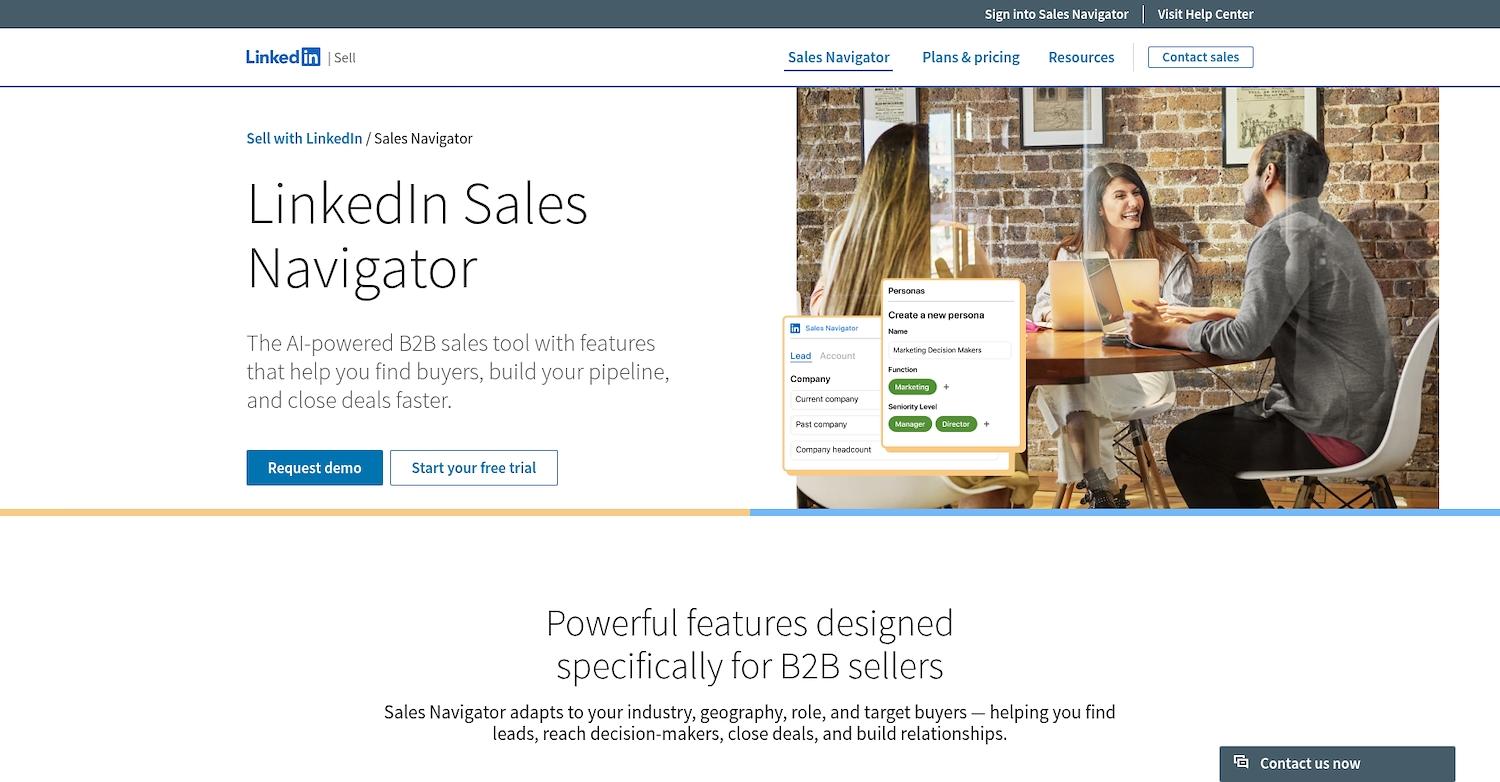
LinkedIn Sales Navigator is a sales intelligence tool that uses LinkedIn's network data. It allows teams to apply advanced search filters to find specific leads and accounts. Users can build prospect lists and save leads for tracking.
The platform provides alerts on job changes and company news. It also includes InMail credits for direct outreach to prospects within the LinkedIn environment.
LinkedIn Sales Navigator's Main Features
- It includes a lead builder tool to construct prospect lists from the LinkedIn network.
- The platform offers data segmentation and filtering capabilities for targeted searches.
- It provides integration with CRM and marketing automation systems to connect with existing workflows.
- The tool makes industry research available to help users understand market context.
How LinkedIn Sales Navigator Compares to SalesIntel
Average Review score: 4.3/5 stars based on 1,990 G2 reviews.
- LinkedIn Sales Navigator provides access to the entire LinkedIn professional network. This is different from SalesIntel, which offers a curated database of contacts.
- The tool provides real-time updates on job changes and company news directly from user profiles. SalesIntel's data, while human-verified, does not offer this type of live social signal.
- It includes InMail for direct messaging within the LinkedIn platform. In contrast, SalesIntel provides contact information but requires a separate tool for outreach.
- Its lead builder uses the live social network to find prospects. This allows for searches based on dynamic user activity, a different approach from a search of SalesIntel's static database.
Where LinkedIn Sales Navigator Falls Short
- LinkedIn Sales Navigator relies on user-provided information, which can sometimes be outdated. In contrast, SalesIntel uses a human research team to re-verify its contact data, which often provides higher accuracy for direct-dials and emails.
- It does not include a research-on-demand service for hard-to-find prospects. In comparison, SalesIntel allows users to request specific contact details, which its research team then finds.
- The platform's primary outreach method is its InMail system. In contrast, SalesIntel provides direct, human-verified phone numbers and emails for use in any external outreach tool.
How the Pricing Models Compare
LinkedIn Sales Navigator offers several subscription tiers with public pricing, providing upfront cost clarity. In contrast, SalesIntel uses a quote-based model, so you will need to contact its sales team for a custom price.
Which One Should You Go With?
The choice of a SalesIntel alternative depends on many factors, including your team's budget and workflow. We have presented the top options to help you make an informed decision based on your specific requirements.
If you want to automate sales tasks, consider 11x. Our platform uses AI agents for prospect identification, outreach, and lead qualification. This approach combines multiple functions into one system, which can reduce the need for separate tools and let your team focus on deal closure.




